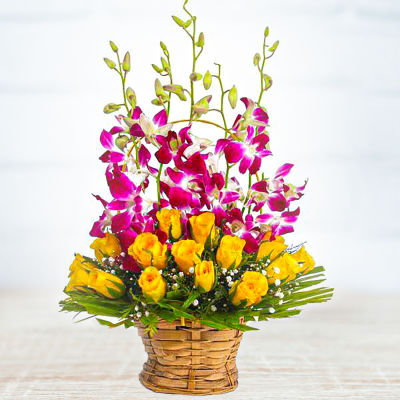Raksha bandhan is coming up, and with it, the potential of millions upon millions of flowers being given to individuals who have a particular place in the hearts of those who send them. August is also the month of bonds between brothers and sisters. According to current estimates, almost 2 million flowers will find their way into the lives of “significant others” throughout India each year. Flowers are noteworthy in various ways, not the least of which is their ability to exert influence or power over individuals in their immediate vicinity. It should come as no surprise that flowers occupy a particular place in the hearts and minds of people everywhere. People have used Flowers from the beginning to convey their emotions, beautify their surroundings, and remember significant events. For example, in Israel, a 14,000-year-old burial hole was discovered to contain imprints of stems and blossoms from plants such as mint, which were thought to be extinct. Floral arrangements have been found in vases and bowls later on, while Greek and Roman cultures wore flowers in the form of garlands and wreaths more often than not. Floral arrangements had grown considerably more complex and widespread by the time of the Renaissance period. It did not limit the usage of flowers to exceptional events but also for everyday use in the home. Throughout history, flower design and usage have evolved in response to the times. Flowers are now an essential part of our everyday life, and They may use them to communicate a wide range of emotions, from deep sorrow to ecstatic delight, among others.
Until recently, the seemingly insatiable desire that individuals appear to have for flowers in their life has not been studied in a scientifically sound manner. That changed some years ago when the psychological impact on individuals was noticed. Floral remedies have the potential to alleviate stress and enhance mental well-being. Many people were unsurprised by the consequences, which were both intriguing and predictable. Flowers have an instant positive influence on one’s mood. It responded to receiving flowers with “genuine” or “excited” grins, indicating exceptional joy and gratitude. Flowers have a long-lasting beneficial influence on people’s moods and emotions. It demonstrates that the recipient’s mood is less sad, nervous, or disturbed due to getting flowers. In addition, they demonstrated a stronger sense of happiness and life satisfaction than before. Flowers have a reputation for fostering close relationships amongst individuals. Individuals’ enhanced communication with family and friends was facilitated by the appearance of flowers in their immediate environment. It has been shown that flowers have a significant influence on the elderly. According to research, flowers can help alleviate sadness, improve social networking, and assist people’s memories to refresh as they get older.
Seniors who get flowers appear to have a reduction in depression

Compared to seniors who did not get flowers, those who did receive flowers scored much higher on memory tests. According to the study’s findings, a tiny dosage of nature (such as flowers) may do wonders for our well-being as we get older. Flowers are known to induce sentiments of sympathy. Fresh-cut flowers in the home setting have been shown to boost people’s sentiments of compassion and goodwill toward others. Indeed, this is true even when the flowers were just in the house for a brief period. You can do flower delivery in Bangalore to your parents to make them healthy.
Flowers are said to alleviate “the blues.” The least negative after spending time in the company of flowers. Floral arrangements put in areas often visited in the morning after waking might assist in dispersing the “morning blahs.” Flowers provide a physical and psychological “boost” to those who receive them. Those who have flowers in their home surroundings report higher vitality, pleasure, and excitement at work. Finally, flowers may be pretty effective simply because they are typically given as gifts. Feelings of improved pleasure, health, and a sense of being more intimately linked with people can arise from the act of thankfulness and giving. In the case of flowers, recipients feel a strong connection with their gift-givers, and this good connection is especially noticeable in the case of gifts. Aside from flowers, there isn’t anything else that may bring such pleasant sentiments and views in both parties as they can with flowers. Flowers may be used to convey happiness as well as to communicate sympathy. Flowers, in both situations, aid in creating an intimate connection between two individuals that frequently surpasses the use of words. Given that flowers have an instant influence on happiness and a long-term beneficial effect on mood, it is easier to see why flowers are essential and what power they possess.
Flowers Have a Spiritual Importance:
The flower is a symbol of purity, power, and unselfish devotion. It inspires the entire human race to walk the road of virtue. Since ancient times, the sight of beautiful fresh flowers has been known to have a calming and pleasant impact on the receiver, doing flower delivery in Gurgaon and presenting them to some is a bliss. Which is why they have had a particular position in the history of humanity. In the middle of all of this, the lotus, also known as the Padma, is revered in Indian culture as a symbol of purity. A variety also knows the flower of other names, including “Indian Lotus,” “Holy Lotus,” and “Bean of India.” Given its relationship with Hindu deities such as Brahma, Vishnu, Devi, Lakshmi, and Saraswati, it is regarded as a holy flower in India. The lotus flower, which appears in the Buddhist emblem, represents the body, speech, and mental purity. Even after emerging from the muck, these blooms bloom on long stalks, as if hovering above a body of water teeming with desire and hatred. Other flowers, such as the Star Jasmine (Kunda) and the Plumeria, are significant in Indian tradition.